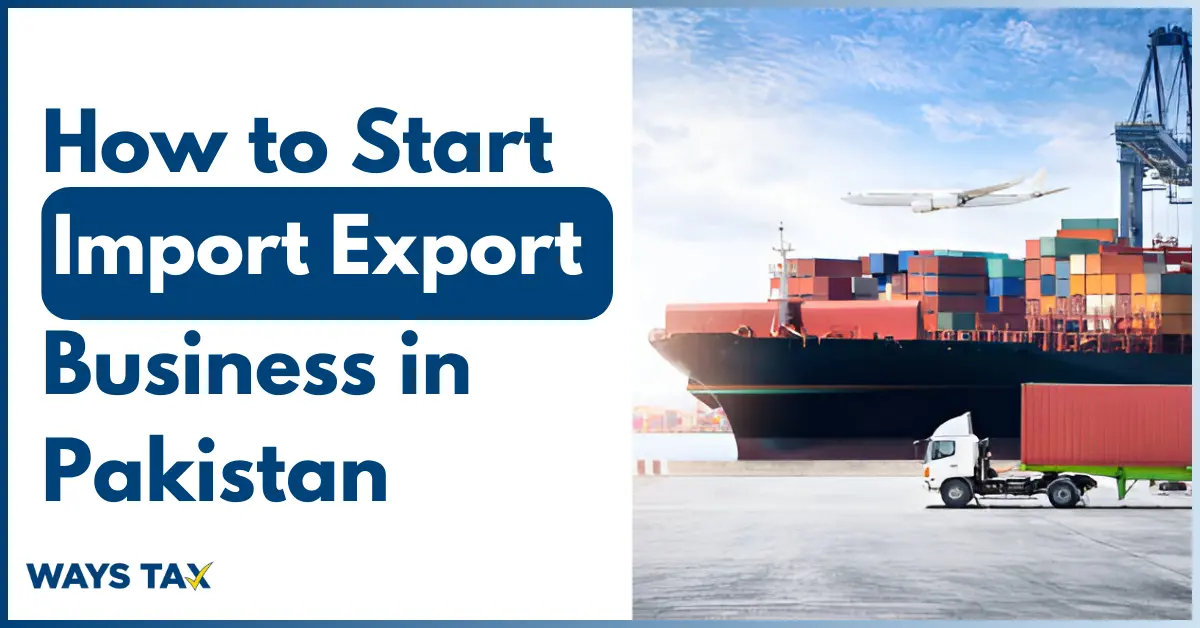How to Start Import Export Business in Pakistan
With Pakistan’s key trade routes and emerging markets, starting a business in this area is not only profitable but also an important step toward economic growth.
This growing country offers opportunities for entrepreneurs to take local products and connect them with international markets, boosting both economic growth and prosperity.
It is noted that according to the Pakistan Bureau of Statistics, Pakistan achieved an export total of $27.724 billion in the fiscal year 2023, while imports were much higher, reaching $55.198 billion during the same period.
However, the journey comes with hurdles, like dealing with complex rules and unpredictable market volatility.
In this blog, we have given a detailed answer to how to start an important export Business in Pakistan and have made the essence of trade – buying and selling goods to far-off lands – easier to understand.
Before we start, let’s discuss concisely the documents required for starting import export business in Pakistan.
Register Your Import & Export Business with Waystax
Get expert help for global operations: registration, tax, and legal compliance.

Documents Required For Starting Import Export Business In Pakistan
| Document | Significance |
| NTN (National Tax Number) | Your ID for taxes in Pakistan. |
| Company Registration | Proof that your business exists. |
| Bank Certificate | Shows your financial trustworthiness. |
| Chamber Membership Certificate | Access to business networks and support. |
| Sales Tax Registration | Your commitment to paying sales tax. |
| Application Form | A formal request to start your business. |
| Authority Letter | Allows someone to act on your behalf. |
| Copy of CNIC | Your personal identification in business. |
| Passport Size Photographs | A photo of you for business records. |
How to start import export business in Pakistan | Export Business Steps
Let’s start with the export business step-up:
Step 1. Business Registration for Export
The business must first become registered with the relevant authorities to start exporting. This includes;
- Registration with the Trade Development Authority of Pakistan (TDAP): It supports the exporters with trade development and market research. It aids in developing market access for trading companies.
- Chamber of Commerce Membership: A firm must be a member of the Pakistan Chamber of Commerce as it provides essential certification for export-related documents.
- Sales tax registration applicable: For some products and a few industries, you need to do sales tax registration.
Register Your Company
You can register as a Sole Proprietorship, Partnership firm, or Company. Steps include:
Choose a Company Name and Logo
- Open a business account with an authorized bank.
- Set up an office with facilities like a valid postal address, landline, fax, office furniture, and equipment.
Register with the Federal Board of Revenue (FBR)
- Apply for a National Tax Number (NTN) and Sales Tax Registration Number (STRN) at the nearest Regional Tax Office (RTO) or online via the FBR website.
Documents Required for NTN Registration:
- NTN application form
- Proof of business registration
- Memorandum and Articles of Association
- Bank account number
- Copies of National Identity Cards of company directors
- Evidence of business address
Note: Commercial exporters are not required to register for STRN, but if you pay sales tax locally, registering will allow you to claim input tax.
Register with the Chamber of Commerce
Register with the Chamber of Commerce & Industry and the relevant Association to obtain certificates and memberships.
WEBOC Registration
Since 2011, WEBOC ID has been mandatory for customs clearance for both exports and imports. You can hire a clearing agent to handle WEBOC registration and related customs documentation.
Register with SECP
You need to register with the Security Exchange Commission of Pakistan (SECP). For online registration follow the below steps. Alternatively, consult with Waystax for hassle-free SECP registration.
Online Registration Process
- Visit the SECP e-services web page.
- Check the availability of the company name. Reserve the name after account creation.
- Avoid prohibited names (check SECP’s prohibited words list).
- Use a valid CNIC (for Pakistan nationals) or passport (for foreigners).
- Select ‘Fast Track Registration Services’ (FTRS) for same-day registration.
- Complete and submit the online registration form.
- Validate security codes sent via SMS or email to generate a PIN.
- Pay registration fees online via credit/debit card or through a challan at designated MCB or UBL branches.
- You will receive a confirmation email from SECP within a day.
Offline Registration Process
Submit your application to the SECP registrar’s office with three proposed company names. SECP will review the application within 3 to 5 working days.
Documents Required for Company Registration
- Memorandum and Articles of Association (templates available on SECP’s website).
- CNICs of Directors, CEO, and Nominee (for single-member company) or passports for foreigners.
- NOC or Letter of Intent from relevant authorities for specific businesses.
- For foreign companies: List and nationality of directors, company profile, charter documents, and certified copies of Memorandum and Articles of Association.
- Authorization for document submission from subscribers.
- Registration/Filing fees (Rs. 1,800 for online submission, Rs. 3,500 for offline, if nominal share capital is less than Rs. 100,000).
Certification of Incorporation
- SECP will validate your submitted documents. National Institutional Facilitation Center (NIFC) will grant a digital signature or company seal.
- All company directors’ signatures are required to receive the company seal.
- A certificate of incorporation will be issued (electronically or physically), allowing you to start your business.
Registration with REX for EU Exports
For exporting to the European Union, register with the Registered Exporter (REX) system through the Trade Development Authority of Pakistan (TDAP).
Hassle-Free Import & Export Business Registration
We handle the paperwork so you can focus on trading and growth.

Step 2: Market Research and Selection
- Market Selection:
- Product Research: Conduct comprehensive research on your product to identify possible markets.
- Apply trade directory data analytics, like ITC, UNCTAD, WITS, PBS
- Study the economy of each country and analyze its market size, growth prospects, pricing, and barrier of trade.
- Product Marketing:
- Business Plan: It should be a comprehensive business plan
- Good Digital Presence: website, promoting materials
- Participate in an International Exhibition.
- Use e-commerce portals like Alibaba, and TradeKey for marketing.
- Utilize social media to reach targeted markets.
- Government Support:
- TDAP offers incentives in terms of rebates on international trade fairs.
- Contact Pakistan Missions overseas and seek their help in obtaining importers.
Step 3: Preparing for Export
- Product Preparation
- Products must be of quality and requirements as per the regulating norms of the importing country.
- They must adhere to international quality standards such as ISO 9000, TUV, etc.
- Packaging must be done properly to safeguard against transit damage.
- Market Research
- Research countries with higher demand for exports.
- Understand trade regulations besides consumer preferences.
- Trade Financing
- Export Finance Scheme (EFS) for low-interest loan facility.
- Utilize letters of credit, which guarantee payment.
Five Things Not to Do in Contract Negotiation
- Don’t Forget Import Controls: Before you export, make sure to see if the foreign market has any restrictions on your product. These rules might include bans, quotas, or needed licenses based on where the product comes from, what it is, or its special features.
- Don’t Dismiss Country Risk: Apart from looking at the buyer, also check the country’s government and economy. Picking the right way to get paid is key to avoiding problems in receiving payment.
- Don’t Neglect Insurance: It is important to have proper insurance based on when ownership and risk transfers occur. Make sure you know who is in charge of getting and paying for this insurance.
- Don’t Depend Only on Letters of Credit: A letter of credit assures payment but does not cover important terms, such as product approval, warranties, or how to resolve disputes. Have a clear export contract to lessen risks.
- Don’t Pick Harmonized Codes Randomly: Use the Harmonized Tariff Schedule carefully for classifying duties, as duty rates can differ. Select the code wisely to manage duty costs in various countries.
Step 4: Documents Required for Export From Pakistan and Logistics
- Core Export Documentations
- Goods Declaration (GD): Primary customs document.
- Packing List (PL): Lists shipment content.
- Commercial Invoice: Describes goods, as well as terms of sale.
- Certificate of Origin: Verifies the origin of the product for customs.
- Bill of Lading: Contract of carriage.
- Compliance with Authorities
- Should fall in line with customs and SPS requirements.
- Logistics
- Use the forwarder to deliver goods with hassle delivery.
- Handle documentation for clearance.
Step 5: Acquisitions of Orders and Verification of Agreements
- Trade Enquiry and Price Quotations
- Quote competitive prices and respond to trade inquiries.
- Proforma Invoice: You will need to expand on this sheet to list the products that you’ll sell and their prices.
- Buy and Export Order:
- Cross-verify with all documentation provided by the buyer about whether they meet your desired specifications.
- Proforma Invoice submitted upon receipt as relating to the payment agreement.
- Terms and Conditions Negotiation
- Draw out a written export contract that outlines all the details you think are important (products, price, terms of payment).
- After you agree, finalize, and sign the contract with the buyer; it will bind you for sure.
Step 6: Export Procedures in Pakistan
- Customs Clearance:
- Submit Goods Declaration and Packing List.
- Know the customs channels (red, yellow, green).
- WeBOC System: Apply Web-Based One Customs to automate shipment clearance.
- Export Process Steps:
- Coordinate with the client on the preparation of documentation (invoices, GD).
- Clear goods through customs and agree on freight arrangements.
Step 7: Post-Shipment Procedures
- Payment Procedures
- Secure payment on letters of credit or through collection arrangements
- Administer export bills (discounted, collected, negotiated).
- Export Documentation Process
- Process Form “E” for every export
- Collect shipping documents for presentation to the bank within the stipulated period.
- Export Incentives:
- Take advantage of the facility of government incentives, such as Duty Drawback & Export Development Fund.
How to start import export business in Pakistan | Import Business Steps
If you think of opening an import business in Pakistan, you must know what you need to do and the procedures followed to open this business.
Therefore, here is a list of who can import into Pakistan and the steps required to open an import business in Pakistan.
Quick & Easy Import Business Registration
Get expert assistance with business registration, import licensing, tax compliance, and legal formalities.

Who Can Import in Pakistan?
In Pakistan, local investors as well as foreign investors are allowed to import. Foreign investors can even establish 100 percent foreign-owned import companies.
Generally, it is available for anyone, partnership or corporation with some particular necessary conditions to import goods to Pakistan:
- Obtain National Tax Number (NTN): It is issued by the FBR. Obtain a Sales Tax Registration Number (STRN): This is also issued by the FBR.
- Open a Bank Account: You will need a local bank account in Pakistan to carry on business activities.
- Become a Member of the Chamber of Commerce and Industry (CCI): You would require membership of any relevant CCI.
- Obtain Import License: Pakistan does not technically require an import license. However, an import license can prove useful in making an import smoother and easier when applicable to a product with strict regulations.
To obtain an import license, one needs to demonstrate that they meet the requirements set out above and submit their documents to the FBR.
Such services could be obtained from a company such as Emerhub, which would be able to manage your requirements and arrangements.
The acquisition of an import license usually takes a month.
Step-by-Step Process for Setting Up an Import Company in Pakistan
The Securities and Exchange Commission of Pakistan is the body responsible for the incorporation of companies in Pakistan.
Steps to establishing an import company are, therefore, identical to a host of other business entities in the country.
First Step: Name Approval
- Get approval for your business name.
- Once approved, submit all incorporation documents within 90 days from then.
Step 2: Filing Articles of Incorporation
Some important papers need to be ready and submitted with the help of a company secretary/attorney that includes,
- Memorandum of Association:
- Signed by all shareholders, three copies.
- Articles of Association
- Three copies signed by all shareholders.
- Copies of CNIC/National Identity Card for Overseas
- Pakistanis for subscribers, directors, chief executive officers, or authorized representatives. If subscribers are foreigners, then they submit copies of their passports.
- Authorization for Document Filing by the subscribers.
- Registration or Filing Fee: It is according to the amount of authorized capital of your business.
- No Objection Certificate/Letter of Intent/License from the relevant authorities in case of special business declarations on Prescribed Forms.
Once you submit, you will receive a Certificate of Incorporation from the SECP
Step 3: Deposit Shareholder Capital
You have to deposit your respective shares in the bank account of the company after your business’s registration.
Now, after depositing your capital into the firm, you can start running your business.
Step 4: Additional Registers
Apart from the ones mentioned above, your import company would need registration with the FBR for the National Tax Number as well as the Sales Tax Registration Number.
That is another important compliance.
Step 5: Application for the Import License
Lastly, you seek an import license. Make sure that, in general terms, you meet the general requirements and make your necessary documents available to FBR.
Import licenses are not strictly required, as has been mentioned above, but this will indeed facilitate the import activities on your end.
Benefits of Import-Export Business in Pakistan
- Economic Growth: Adds to GDP, provides employment, and earns foreign exchange.
- Market Expansion: The possibility of accessing global markets and diversified revenue streams or sourcing diverse products.
- The skill development of enhancing expertise and innovation.
- Government Support: Favorable policies and subsidies.
- Competitive advantage: Location, competitive pricing.
Glossary Import-Export Terms
- Import is the process of bringing goods into another country from another country.
- Export is the process of sending goods out of one country to another country.
- A supplier refers to a company or person who provides another company or person with goods or services.
- A customer refers to the one who buys goods or services from another company or a person.
- Freight Forwarder: An enterprise that would secure a number of services for the shipper to forward his commodities. Their work can encompass logistics, documentation, and customs clearance.
- Customs Clearance: The official permission obtained from the customs authorities regarding the import/export of commodities. All necessary documents are submitted with corresponding duties and/or tax charges.
FAQs
Wrapping Up
To summarize, knowing how to start an import export business in Pakistan includes registration of your firm, licensing as well as carrying out a detailed market study.
If done in the right way and the legal framework is observed, it is possible to enter foreign markets and expand the organization.
Also, you don’t need to worry about the registration and taxation process; Waystax will sort it out for you!
Reference Links:
- https://www.google.com/url?q=https://www.pbs.gov.pk/sites/default/files/external_trade/Annual_Analytical_Report_on_External_Trade_Statistics_of_Pakistan_FY2023.pdf&sa=D&source=docs&ust=1731077461714767&usg=AOvVaw2YYwgTprUF7r6vU0hmclJV
- https://tdap.gov.pk/
- https://mofa.gov.pk/overseas-missions
- https://www.sbp.org.pk/incen/rs/3.1-Export-Finance-Scheme.pdf
- https://www.wto.org/english/tratop_e/sps_e/sps_e.htm
- https://emerhub.com/pakistan/import-company-pakistan/
- https://tradingeconomics.com/pakistan/exports/other-made-textile-articles-sets-worn-clothing

